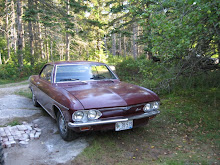There's nothing more satisfying than believing that your classic car can be "tuned up" by turning a couple of screws on the carburetor[s]. Generally it's totally false while being totally satisfying.
Once again, this canard exposed itself when the Land Rover began to run roughly. My heart cried for a solution that used a flathead screwdriver on the two adjustment screws on the Weber carburetor, but head knew the problem lay inside the distributor.
So I ordered a set of new points, a new condenser and a rotor. I should have ordered a cap, too, but I forgot and lucked out when the current one looked to be in great shape.
I installed them yesterday. The points, condenser and rotor cost less than $10 apiece. Other than the fiddly problem of two tiny screws that you don't want to drop or lose [I used a bit of grease on the end of each screwdriver to "glue" the screw onto the tip of the screwdriver], it's a simple job. I gapped the points to .016, reassembled everything, and started the car - it fired up instantly and smoothly.
I never did touch the carb on the Land Rover. When tuning up the Corvair or the TR-7 with their twin carbs, I find that once adjusted, they rarely go out of adjustment. The Corvair's points distributor really determines how well it starts and runs; the TR-7 has the Lucas "electronic ignition," which means no points but the common rotor and cap only.
No question, fiddling with the carbs provides more entertainment and less back-breaking leaning over the car, but poorer results. Most of the time, it's the electronics, stupid.
Subscribe to:
Post Comments (Atom)










No comments:
Post a Comment